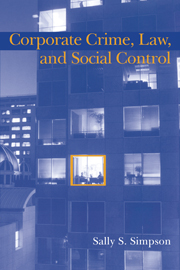Book contents
- Frontmatter
- Contents
- Preface
- 1 Criminalizing the Corporate Control Process
- 2 Deterrence in Review
- 3 Assessing the Failure of Corporate Deterrence and Criminal Justice
- 4 Corporate Deterrence and Civil Justice
- 5 Corporate Deterrence and Regulatory Justice
- 6 Cooperative Models of Corporate Compliance: Alternatives to Criminalization
- 7 Criminalization versus Cooperation: An Empirical Test
- 8 Shaping the Contours of Control
- Appendix A Study One: Questionnaire Items and Responses
- Appendix B Study One: Sample Characteristics
- Appendix C Study Two: Questionnaire Items and Responses
- Appendix D Study Two: Sample Characteristics
- Name Index
- Subject Index
2 - Deterrence in Review
Published online by Cambridge University Press: 10 December 2009
- Frontmatter
- Contents
- Preface
- 1 Criminalizing the Corporate Control Process
- 2 Deterrence in Review
- 3 Assessing the Failure of Corporate Deterrence and Criminal Justice
- 4 Corporate Deterrence and Civil Justice
- 5 Corporate Deterrence and Regulatory Justice
- 6 Cooperative Models of Corporate Compliance: Alternatives to Criminalization
- 7 Criminalization versus Cooperation: An Empirical Test
- 8 Shaping the Contours of Control
- Appendix A Study One: Questionnaire Items and Responses
- Appendix B Study One: Sample Characteristics
- Appendix C Study Two: Questionnaire Items and Responses
- Appendix D Study Two: Sample Characteristics
- Name Index
- Subject Index
Summary
given the importance of a deterrence framework perspective as a rationale for bringing more criminal law into the corporate crime control process, the philosophy of deterrence deserves a more systematic treatment. Accordingly, in this chapter, we focus exclusively on the deterrence doctrine. Specifically, I trace the philosophical development of deterrence from the simple views of rationality and hedonism put forth by eighteenth-century utilitarians to the various positions advocated today by social scientists; and then examine what studies tell us about the relationship between formal legal sanctions and control of conventional crime, and the deterrent effects of criminal justice processing for corporate offenders.
Rationality and crime
The classical school
The origins of deterrence lie in the so-called classical school of criminology. Cesare Bonnesana Marchese de Beccaria (1738–1794) and Jeremy Bentham (1748–1832), the two philosophers most strongly identified with this tradition, were influenced by Enlightenment ideas about human nature and the development of society. Beccaria argued that human beings, upon joining society, gave up certain individual freedoms in exchange for the protection and security that society offered. The social contract that was established from this exchange gave the state the authority to establish law and to punish violators.
Classical criminologists assumed that all persons were capable of criminality because of a “natural” human tendency to pursue pleasurable activities. This natural hedonism, however, was tempered by rationality. Individuals would weigh the benefits of crime against the consequences of punishment before a course of action was decided.
- Type
- Chapter
- Information
- Corporate Crime, Law, and Social Control , pp. 22 - 44Publisher: Cambridge University PressPrint publication year: 2002



